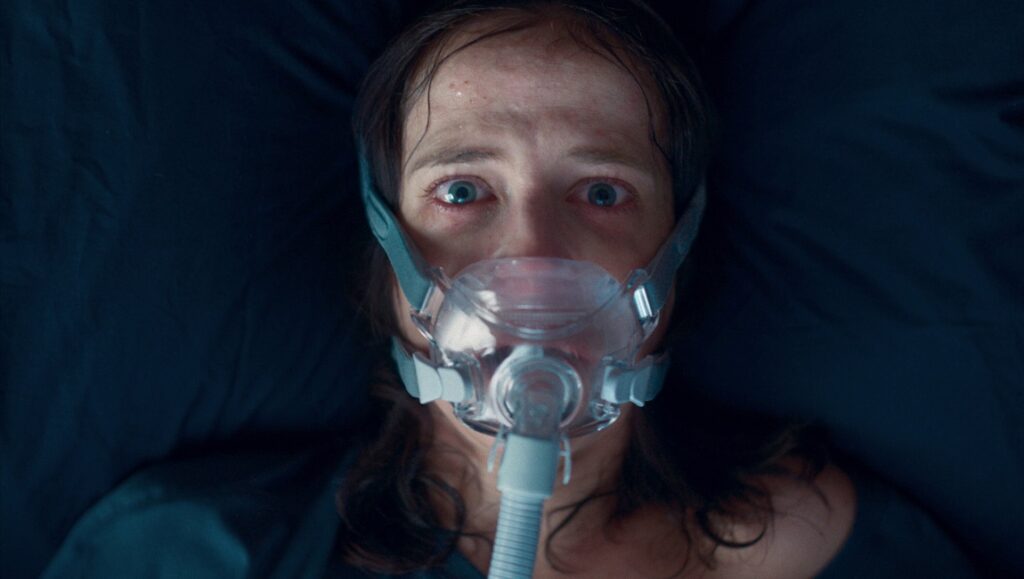Any nerve-shredding tendencies present in Nocebo are punctured by its clunky exposition, predictable ending, and insistence on trite messaging.
There are two kinds of clinical films, broadly speaking: the film that lives and breathes sterility as its subject matter, employing vacuumed precision in the diagnosis of pathologies and emotions, and the film that, rather unintentionally, recycles its metaphors of bodily anxiety and displacement with ill-conceived intent. Nocebo, Lorcan Finnegan’s sophomore effort, falls squarely into the latter category. A portrait of bourgeois domesticity shattered by the intrusive Other, Nocebo does not however seek comfort in the lampooning of said domesticity proper; such a move, characteristic of directors like Michael Haneke or Ulrich Seidl, has its own charms and flaws, and your mileage may vary with respect to individual thresholds for violence. No, Nocebo aims for the other end of the spectrum, effectively instituting a dialectics of evil that first immerses the viewer squarely in uncanny, possibly unsympathetic waters, before dramatically shifting the calculus of blame and moral responsibility to the “good guys” near its all-too-predictable ending.
Christine (Eva Green) is a fashion designer living comfortably in metropolitan Dublin’s suburbs with her husband Felix (Mark Strong) and young daughter, Roberta (Billie Gadsdon). Roberta attends a private school, and the logistics of fetching her to and fro constitutes one of the happy family’s biggest frustrations, all until one day when Christine has a premonition of a tick-infested dog at her workplace. Just as quickly as it appears, the canine vanishes into thin air, but not before one of its ticks latches onto Christine and bites her. Fast forward eight months, when she — in declining health — sleeps with a ventilator and a Filipino nanny shows up at her doorstep, not having been hired or invited, apparently. Diana (Chai Fonacier), the nanny, immediately exudes an aura of menace: she’s friendly, but overly so; helpful, but in a saccharine way; and nonchalant about the boundaries between employer and employee, stranger and friend. One could almost imagine Finnegan daring the viewer to articulate these boundaries and thereby entrench stereotypes of class and race even further, as it’s to his credit that Diana’s motivations — and even moral compass — aren’t explicitly fleshed out for the most part, revealed instead through bite-sized flashbacks to her life back in the Philippines.
This indeterminacy, however, shouldn’t be conflated with thematic complexity. Nocebo, in keeping with the fashion of modern genre horror, feels like it has to say something about the color of people’s skin and the commodification of labor and life under global capitalism. Its preoccupations — as an Irish-Filipino co-production, no less — thus render the resultant message numbingly didactic. The initial menace behind Diana’s ambiguous actions dissipates into righteous, heart-rending vengeance, whereas the well-intentioned trio suffer multiple bouts of hallucinations, gaslighting, and brutal infighting. Which is sad, because Finnegan, in so doing, lazily divests all characters, including Diana, of true agency; how can you fault someone who doesn’t even realize what they did wrong, and how can you blame someone for seeking well-deserved revenge? Vivarium, Finnegan’s debut, had little genuine insight about suburban dystopia, but its boxed-in setups engendered a substantially terrifying mental claustrophobia. Here, his penchant for crafting unnerving sequences remains, except it’s punctured too often with clunky, slow-building exposition all leading to the denouement’s big reveal. The thread Nocebo hangs onto quite visibly snaps by that point, and perhaps this is in line with its title: when one sets overly pessimistic expectations about one’s characters, one finds often that they disappoint, to the detriment of storytelling.


Comments are closed.